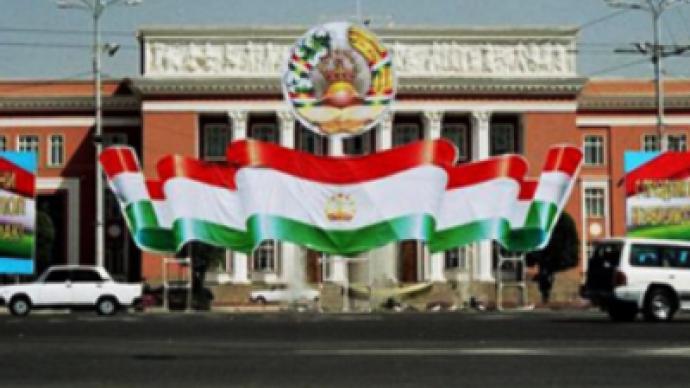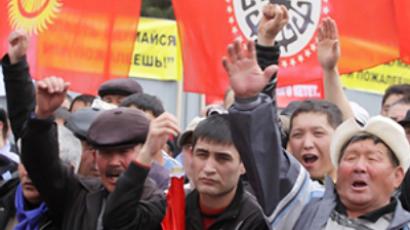Tajikistan ruling party records landslide victory in parliamentary election

The Tajik Central Election Commission has proclaimed the victory of President Emomali Rahmon’s People’s Democratic Party of Tajikistan in elections for the lower house of the country’s parliament.
According to preliminary results, the party has mustered almost 72 per cent of the vote. Candidates from the opposition Party of Islamic Revival and the Communist Party also secured seats in the parliament, while the rest of the parties failed to pass the five-per cent election threshold. The Central Election Commission a reported a voter turnout of 85.2 per cent, with almost 2.9 million people casting their ballots.
Altogether, eight parties participated in the elections and as many as 217 candidates were competing for 63 seats in the legislative chamber of the national parliament, which is elected every five years.
In the previous parliament, the People’s Democratic Party had 57 seats, the Communist Party four and the Islamic Revival Party two. The current president, Emomali Rakhmon, who has been ruling the country for almost two decades, was re-elected leader of the People’s Democratic Party in December last year. His eldest son, Rustam (23), is believed to be his likely successor. The president’s son was running for a seat in the Dushambe city legislature, as elections to regional, municipal and local bodies were also held on Sunday.
OSCE and opposition Concerns over the election’s legitimacy
International observers, however, have labeled Tajikistan’s parliamentary elections “undemocratic”. Monitors from the Organization for Security and Co-operation in Europe (OSCE) and European parliament reported “serious irregularities” during Tajikistan’s Sunday parliamentary elections. "I'm happy that the election day took place in a generally good atmosphere, however, I'm even more disappointed that these elections failed on many basic democratic standards," said Pia Christmas-Moller, vice-president of the Parliamentary Assembly of the Organization for Security and Cooperation in Europe (OSCE).
Among the violations on the election day, the international observers have highlighted “prevalence of family and proxy voting and cases of ballot box stuffing,” Christmas-Moller said.
Monday’s OSECE report also criticizes the state television news coverage of the campaign, claiming that it was minimal, and thus limited voters’ ability to make an informed choice.
In the past, Western country observers have never recognized presidential or parliamentary elections in Tajikistan as “meeting the democratic standards.”
Opposition party leaders also criticized the elections. The Islamic Renaissance Party of Tajikistan (IRP) declared the elections “far from transparent and democratic”, saying that they are ready to challenge the results in court. “During the whole election campaign the party was registering violations, however the mass falsification peak was on election day,” said the IRP’s leader, Mukhiddin Kabiri, to Itar-Tass on Monday. As part of those violations, he claims that the opposition parties’ observers were not permitted to monitor the tabulation of the votes. He also says that his party observers registered instances of rigging of the electoral votes, as they have observed cases when the number of ballot papers in the ballot boxes exceeded the actual number of voters.
The leader or the Social Democratic Party of Tajikistan, Rakhmatillo Zoyirov, has also criticized the elections, saying “the distortion of the will of the electorate, the power bodies’ dictate to them, turned out to be even higher than at the 2005 parliamentary elections.”
CIS observers think differently
However, unlike the international monitors, the CIS countries’ observers have recognized the elections, calling them free and open, corresponding to the national election legislation. The Mission’s head, Chairman of the CIS Executive Committee, Sergei Lebedev, noted that "the elections ensured expression of will by the citizens and demonstrated the further strengthening of democratic norms in the life of the Republic of Tajikistan.” He admitted, though, that separate violations were registered by 160 mission observers, however, he says they “didn’t affect the election results on the whole.” Lebedev also stressed that, by his personal observations, “Tajikistan has, in recent years, had positive changes towards democracy”.
Tajik government reaction
Commenting on the critical election assessments from international bodies, Tajik’s government said that Tajikistan is not a chessboard where one can play by somebody else’s rules. Ahead of the elections, the Tajik president vowed to become the guarantor of fair and transparent elections.
The current president holds a firm grip on power. Tajikistan is a presidential republic, where the President is the head of state and the head of government, and of a multi-party system. The former Soviet republic gained its independence in 1991, during the break-up of the Soviet Union.
Olga Masalkova, RT













